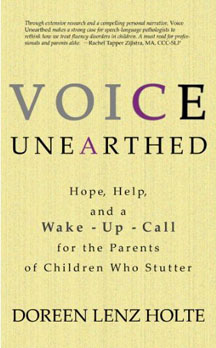
This is a review of the book Voice Unearthed: Hope, Help and a Wake-Up Call for the Parents of Children Who Stutter, by Doreen Lenz Holte.
Doreen Lenz Holte wrote Voice Unearthed about her journey to seek help for her son, Eli, who stutters. Like a lot of parents, she took him for treatment at a very young age. The type of speech therapy he received is the standard fluency shaping/stuttering modification model that is widely used today for both adults and children. She argues that this model for stuttering therapy is failing children.
History
The author outlines the history of stuttering therapy, going back to the 1950s and the famous Charles Van Riper, the forefather of what is now accepted treatment for stuttering. He worked with many adults who stutter, encouraging a highly self-conscious and analytical approach to therapy, including desensitization exercises to reduce the stutterer's fear of speaking. This confrontational approach demanded a high level of motivation on the part of the patient, and a commited work ethic to rehearse techniques that reduced their speaking problems. With some modifications, it is on this foundation that speech therapy today is based.
Speech therapy
The numerous speech pathologists to whom Doreen took her son were well-meaning and well-qualified, but never helped much. Eli enjoyed the sessions, liked his therapists and could achieve fluency in the clinic, but this did not translate into better speech at home or school. In fact, the author watched her son become increasingly depressed and withdrawn, even as she tried, as gently and lovingly as possible, to encourage him to talk and use his speech techniques. She consulted with professionals, attended conferences, and took him to different therapists, but by the time he was 9 years of age, she found herself discouraged, confused and stressed out.
According to the author, the standard approach to speech therapy for children presents them with impossible tasks and unrealistic expectations, and burdens them with feelings of guilt, shame and unworthiness. Children do not have the motivation to speak fluently that adults have, and they do not have the discipline to rehearse speech techniques. Even most speech therapists and researchers, when pressed, will admit there is no evidence that speech therapy shows any success for children that cannot be attributed to the natural recovery rate.
Covert therapy
The man that ended up helping Eli employed what is called "covert therapy". The idea is that empowering a child means letting them be in charge of tasks they can control, to feel engaged in life, and to express themselves in conversation without worrying about stuttering. The therapist, Jerry Halvorson, worked with Doreen and her husband too, coaching them in how to indirectly get their son to talk, without asking questions or judging him, and advising them to "lighten up" and get rid of a "perfectionist attitude".
What will success look like?
The ultimate message of Voice Unearthed is that parents seeking help for a child who stutters, firstly, needs to consider what success will look like. Too many parents expect the child to stop stuttering, something that may or may not be possible. Sometimes parents will have to face that their child will cope with stuttering his whole life. The author describes the process and transformation that helped her son come out of his shell, start to express himself with confidence, make friends, talk more, and generally enjoy life. He still stutters, yet, although its intensity waxes and wanes, he is generally much improved from before.
Not only should parents of children who stutter read this book, but adults who stutter who went through speech therapy as children will get some insight (and possibly some vindication) from this personal and well-written account of some of the issues surrounding stuttering treatment.
Voice Unearthed can be purchased at Chapters.
Doreen Lenz Holte also runs her own blog.